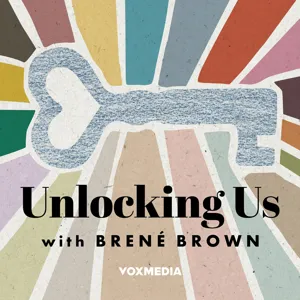Podcast Summary
Exploring interdisciplinary approaches and the importance of continuous learning: Embrace the complexity of the brain, explore multiple interests, and foster curiosity for interdisciplinary discoveries, as the brain is malleable and our choices impact our neurobiological health.
Learning from this conversation between Brené Brown and neuroscientist David Eagleman is the importance of embracing the complexity of the brain and the interconnectedness of various fields of study. Eagleman, who has a background in literature and is known for his work in neuroscience, encourages individuals to explore multiple interests and not feel limited by the STEM vs. liberal arts dichotomy. He emphasizes the malleability of the brain through neuroplasticity and encourages continuous learning and exploration. This conversation highlights the value of interdisciplinary approaches and the importance of fostering curiosity and open-mindedness. Eagleman's new book, "Live Wired," delves deeper into the ever-changing brain and the impact of our choices on our neurobiological health.
The brain's dynamic nature defies traditional hardware and software comparison: The brain, with its 86 billion neurons and over 0.2 quadrillion connections, is not a static organ but a dynamic, ever-changing one, influencing gene expression and adapting to experiences, a concept known as brain plasticity.
The brain functions more like "liveware" or "LiveWired" than traditional hardware and software. The brain is composed of 86 billion neurons, each with thousands of connections to neighbors, creating over 0.2 quadrillion connections. These connections are constantly changing, modifying the brain's physical structure and even influencing gene expression. Unlike hardware and software, the brain is not static but dynamic, adapting to every experience. This concept, known as brain plasticity, challenges the way we think about the brain and highlights the importance of communication between scientists and the public to share the wonders and complexities of this ever-changing organ.
The Brain's Plasticity: More Than Just Shape-Shifting: Our brains are not static objects, but rather, they are constantly learning and growing, adapting to new experiences and information, and evolving our identities.
Our brains are not just "plastic" in the sense of being able to hold a shape, but rather, they are living, dynamic, and electric structures that are constantly changing and evolving. This concept goes beyond the idea of simple shape-shifting, as our brains are complex and require new strains of mathematics to understand. The term "malleable" may be a better fit, as it emphasizes the brain's ability to change and adapt in response to new experiences and information. Unlike a molded plastic figure, our brains are not static objects, but rather, they are constantly learning and growing, even as we interact and communicate with others. This is why our identities are constantly evolving, and why we are not the same people we were 5, 10, or even 15 years ago. The brain, in its isolated and darkened chamber within our skulls, is the command center of our bodies, and it relies on external data to make sense of the world. It's fascinating to consider that our brains create a map of our bodies all on their own, and that this map can change in response to injury or loss. Overall, the brain's plasticity is a remarkable aspect of human biology, but it's important to remember that it's a complex and dynamic process that goes beyond simple shape-shifting.
The Brain's Adaptability and Efficiency in Learning New Skills: Through practice, our brain learns new skills and hardwires them, requiring less energy and conscious thought. Muscle memory is a mental phenomenon, not a physical one, and once a skill is automated, we lose conscious access to it.
Our brain is incredibly adaptable and efficient. It learns new skills through a process similar to motor babbling, where we try things out and receive feedback to figure out the correct movements. The more we practice a skill, the more it becomes hardwired into our brain, requiring less energy and conscious thought. This is why experts in a particular field seem to perform effortlessly, even though they may be using more energy than beginners in other areas. Muscle memory, which is often thought of as a physical phenomenon, is actually a mental one, with the brain burning skills down to the unconscious level. However, once a skill is automated, we lose conscious access to how we perform it. So, the next time you're feeling frustrated while learning a new skill, remember that with practice, it will become second nature and require less energy and thought.
Critical windows of development for certain skills: Understanding critical windows of development for skills like language acquisition is crucial for proper brain development. Failure to meet these windows can lead to significant cognitive deficits.
Our brains are incredibly malleable, but not all parts develop at the same rate. Some areas, like the visual system, cement themselves early on because they deal with a limited range of data. Other areas, like the motor system, stay flexible throughout life due to constant changes. However, there are critical windows of development for certain skills, like language acquisition, which must be met for proper development. Failure to meet these windows can result in significant cognitive deficits. For instance, the tragic cases of Danielle and the Romanian orphanages demonstrate the importance of proper input during these critical periods. The human brain's flexibility has led to incredible achievements, but it also comes with risks. It's essential to understand these windows and ensure that children receive the necessary stimulation during these crucial stages.
The brain's aging process: a double-edged sword: The brain's plasticity decreases with age, but this loss of flexibility allows for the acquisition of valuable knowledge and skills
While different parts of the brain have varying degrees of malleability throughout life, the brain's plasticity diminishes with age. However, this loss of flexibility comes with benefits, such as the ability to learn the world around us, including language, social norms, and career skills. For instance, the visual system's basic functions like colors and angles become less malleable over time, but the ability to learn new faces remains flexible. Although adults may find it more challenging to learn new skills compared to children, the knowledge and experiences accumulated over a lifetime contribute to an efficient internal model of the world. Ultimately, the brain's aging process is a double-edged sword, offering both the loss of flexibility and the gain of expertise.
Continuous learning and engagement keep our brains healthy: Engaging in new experiences and stimuli can help maintain cognitive function as we age, while a lack of challenge may lead to cognitive deficits.
Our brains continue to change and adapt throughout our lives, and the rate of this change depends on our exposure to new experiences and stimuli. If we choose to live a small, unchallenging life, our brains may deteriorate more quickly and we may experience cognitive deficits as we age. However, if we continue to learn new things, face new challenges, and engage with others, we can build new neural pathways and maintain cognitive function. This is exemplified by a study of nuns who, despite having Alzheimer's disease, showed no cognitive deficits due to their constant engagement with others and new experiences. The brain is like a city, with different layers operating at different paces. Just as a city requires infrastructure for transportation, housing, and commerce to function, our brains require ongoing stimulation and challenge to maintain their health and function optimally. So, as we age, it's important to continue to learn, engage with others, and step out of our comfort zones to build new neural pathways and maintain cognitive function.
The Brain's Timescales and White Matter Damage in Dementia: The brain's memory consolidation follows Rabot's law, with older memories being more stable. White matter damage in dementia disrupts brain communication, leading to memory loss and cognitive decline.
Our brains, like cities, operate on various timescales. Older memories are more stable because they've had more time to be consolidated, a concept known as Rabot's law. This phenomenon, unique to the brain, can be explained by the idea of pace layers, where faster changes are gradually adopted by slower layers. This understanding can help us grasp complex phenomena, such as the functioning of cities or the behavior of our own minds. Regarding dementia, it's a condition that affects many people and is often associated with the loss of memory. When someone is diagnosed with dementia, doctors often discuss white matter in the brain. White matter is crucial for transmitting signals between different regions of the brain. Damage to white matter can lead to communication problems within the brain, contributing to the memory loss and cognitive decline seen in dementia. To learn more about the underlying causes of dementia and potential treatments, I would recommend consulting neuroscientific research and medical professionals. Understanding the intricacies of the brain and its diseases can lead to valuable insights and progress in the field of neurology.
Memory formation and consolidation in the brain: The complex process of transforming short-term memories into long-term memories involves various brain structures and processes, and is particularly challenging for individuals with dementia. Senses, including smell, play a crucial role in emotional experiences and highlight the brain's intricacy.
Memory formation and consolidation, which involves the transformation of short-term memories into long-term memories, is a complex process that requires proper functioning of various structures and processes in the brain. This is particularly challenging for individuals with dementia, as the distinction between different types of dementia can be difficult to make even during autopsy. Moreover, the senses, including our sense of smell, play a crucial role in our emotional experiences, as different sensory inputs can evoke varying emotional responses, even when the underlying chemical structures of the inputs are similar. This highlights the intricacy of the brain and the ongoing efforts in neuroscience to better understand these processes.
Our senses connect emotions and memories: Smells and tastes evoke powerful memories and emotions, while sights can bring feelings of peace, fear, or disgust. Our brains make correlations between our senses, allowing us to learn and navigate the world.
Our emotions and memories are deeply connected to our senses, particularly smell and taste. Our brains are wired to associate certain smells and tastes with specific memories, creating powerful emotional responses. For example, the smell of a certain food can transport us back to a specific moment in our past. Similarly, the sight of a beautiful meadow can evoke feelings of peace and happiness, while the sight of a dismembered body can cause fear and disgust. This is because our brains are constantly processing data from our senses and making correlations between them. Even unusual sensory pathways, like feeling vibrations on the skin instead of hearing sound, can eventually be perceived directly by the brain. Our ability to make these correlations and learn from our experiences is what allows us to navigate the world and form meaningful connections.
The Brain's Construction of Reality: Our brain constructs our perception of the world, assigning meaning to data streams and creating feelings based on their information.
Our perception of the world is not a direct experience, but rather a construction of our brain. Neuroscientist Michael Graziano explains that for months after birth, a child's brain is producing spikes without a clear perceptual experience. Colors, for example, don't exist in the world, but our brain assigns wavelengths as colors for a more efficient experience. This concept is known as the "hard problem of consciousness," and it raises the question of why data streams come to have conscious experience for us. Graziano suggests that depending on the information they carry, data streams can come to have feelings. For instance, wearing a wristband that feeds stock market data could eventually make us feel good or bad based on market trends. This idea is both fascinating and strange, highlighting the mysterious nature of consciousness. In his 10-year journey to write his book, Graziano learned the importance of novelty and challenges for brain health. He also gained a better understanding of how our identity drifts and how we can make contracts with ourselves to prevent unwanted behavior. By applying these insights to our daily lives, we can enhance our well-being and better navigate the complexities of the human experience.
Staying committed and accountable: Making promises and setting up accountability structures can help us resist temptations and stay focused on our goals. Removing distractions and considering others' perceptions can also increase bravery.
Making commitments and setting up accountability structures can help us stay on track with our goals, even when we feel tempted or lazy. The speaker uses the example of arranging a workout with a friend as a "Ulysses contract," which he cannot cancel without being an "asshole." Similarly, removing temptations, like alcohol or drugs, or changing Facebook passwords can help individuals resist giving in to their desires. Vulnerability and bravery are interconnected, and sometimes, adopting a different persona or considering others' perceptions can help us feel braver. People may interpret our actions differently, and it's essential to remember that everyone has unique perspectives. The speaker recommends being genuinely curious and open-minded when interacting with others. He also shares that he has recently enjoyed the TV shows "Devs" and "Chernobyl," and his favorite movie is "Inception." His favorite meal consists of tofu, brussels sprouts, and rice, and he keeps his digital library on his iPad by his bedside. A joyful moment in his life is spending time with his kids.
Exploring growth and learning through experiences and connections: Embrace new experiences, connect with others, and value the malleability of the brain for continuous growth.
Both the speaker and Dr. Brené Brown value the importance of learning and growth, whether it's through experiencing new things that ignite curiosity in children or reflecting on life experiences that deepen our appreciation for the present moment. The speaker is deeply grateful for the technology that allows them to connect with others during challenging times, and they find beauty and inspiration in music and art. The speaker's connection to artists like Max Richter and Brian Eno goes beyond their music, as they have had personal interactions with them. The brain is seen as malleable and capable of continuous development, and the speaker encourages listeners to challenge themselves and stay open to new experiences.
Embrace new experiences and challenge yourself to foster brain growth: Try new things, even if uncertain or uncomfortable, to stimulate brain and foster growth. Embrace failure and vulnerability for creativity and innovation.
To keep our brains malleable and adaptable, we need to embrace new experiences, challenge ourselves, and stay open-minded. Neuroscientist David Eagleman encourages us to try new things, even if we're unsure or uncomfortable, as a way to stimulate our brains and foster growth. This can be as simple as brushing our teeth with our non-dominant hand or taking a different route to work. Eagleman's book, "LiveWired," explores the ever-changing nature of the brain and can be found on his website or social media platforms. Another thought-provoking conversation was with Harvard professor Sarah Lewis, who discussed her book "The Rise: Creativity, the Gift of Failure, and the Search for Mastery." In this conversation, Lewis shared insights into the creative process and how embracing failure and vulnerability can lead to growth and innovation. Together, these conversations remind us that staying malleable and growing requires a willingness to be awkward, brave, and kind, even when it's uncomfortable.






